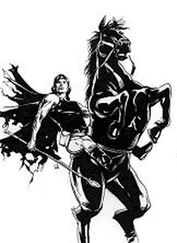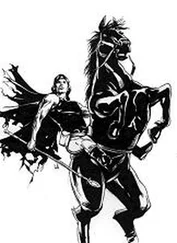Jack Chalker - Priam's Lens
Здесь есть возможность читать онлайн «Jack Chalker - Priam's Lens» весь текст электронной книги совершенно бесплатно (целиком полную версию без сокращений). В некоторых случаях можно слушать аудио, скачать через торрент в формате fb2 и присутствует краткое содержание. Год выпуска: 1999, ISBN: 1999, Издательство: Del Rey / Ballantine, Жанр: Фантастика и фэнтези, на английском языке. Описание произведения, (предисловие) а так же отзывы посетителей доступны на портале библиотеки ЛибКат.
- Название:Priam's Lens
- Автор:
- Издательство:Del Rey / Ballantine
- Жанр:
- Год:1999
- ISBN:0-345-40294-4
- Рейтинг книги:3 / 5. Голосов: 1
-
Избранное:Добавить в избранное
- Отзывы:
-
Ваша оценка:
- 60
- 1
- 2
- 3
- 4
- 5
Priam's Lens: краткое содержание, описание и аннотация
Предлагаем к чтению аннотацию, описание, краткое содержание или предисловие (зависит от того, что написал сам автор книги «Priam's Lens»). Если вы не нашли необходимую информацию о книге — напишите в комментариях, мы постараемся отыскать её.
Priam's Lens — читать онлайн бесплатно полную книгу (весь текст) целиком
Ниже представлен текст книги, разбитый по страницам. Система сохранения места последней прочитанной страницы, позволяет с удобством читать онлайн бесплатно книгу «Priam's Lens», без необходимости каждый раз заново искать на чём Вы остановились. Поставьте закладку, и сможете в любой момент перейти на страницу, на которой закончили чтение.
Интервал:
Закладка:
“Please—sit down, be comfortable,” he invited.
She sat and relaxed, curious. “What is this all about, Father?”
“You, mostly. We’re actually speaking one last time to just about everybody individually. You’re not like the military types. You are in extremely good physical shape and you keep it that way, but you are no professional athlete. You are also somewhat shy around others. I’ve noticed that in mixed company, even in the sim area, you seem self-conscious or a bit nervous.”
“I—well, it’s not something I normally do, you know.”
“Indeed. But it is you who suggests that that is the normal dress down on Helena. We are following your scenarios. Why do you think there won’t even be the proverbial fig leaves down there?”
She shrugged. “We have lived for centuries in a disposable society. Even what we are both wearing now will be simply discarded. It’s easier to simply have our machines create new and fresh ones than to go through all the problems making them heavy-duty and cleanable. Clothes, then, would go early in a post-takeover society and they would be irreplaceable in a culture like ours where everyone can have everything made to order in their own bed-rooms. I suspect that when they first came back onto the surface, they used the fig leaf approach, but that quickly became pointless, as they are that exposed, it’s that consistently warm, and natural biology from sex to taking a crap would be so, well, public. They may have ornamental things, or things denoting rank, but in general nothing we’d think of as clothes beyond some kind of makeshift carrier for weapons or perhaps to carry babies. I don’t think they would understand the concept of modesty, but I was born and raised with it.”
He cleared his throat and nodded. “I see. My problem, Kati, is that we’ll have to put some folks down on the ground. The odds are they will have to travel some distance. Not everyone, of course, but the Colonel and the Sergeant, certainly, as well as our Pooka, and, frankly, me, since I know the land even if I no longer know the world. Takamura and van der Voort will remain aboard; their task will be in developing what we hope to extract. What I am trying to say is that, while we could really use you along, we will be three men and a giant hairy snake, all naked and using only the most primitive of tools and weaponry, and you. You’re not a fighter; I sincerely doubt if you could kill anyone or anything, at least not without such provocation as you do not wish to imagine. Under these conditions, with that kind of party, these kind of men—are you sure you wish to come with us?”
She thought about it. “You’re trying to scare me. They tried to scare me before, remember, when they came and recruited me. Okay, put me down stark naked with a couple of throwbacks to Neanderthal and a world where it’s likely women aren’t held up much as leader material, not if they went, as I believe they did, the way other primitive survivalist societies go—then, yes, I am scared. But I’ve spent my whole life studying these things in the abstract, with no real way to test out my theories, and here is an opportunity to be the first qualified observer to get in and see what happens to humanity after the power goes off. Don’t you see, Father? I can’t not go.”
“That is all I wanted to hear. But I want you doing many more simulations in the next few days, not only alone, as before, but with the rest of the ground party. That means under true sim conditions. We are also going to increase the load, particularly in basic supplies. The survivors down there have discovered what fills you up and what blows you up by now. We don’t know that, so the more we control our own food, the better. At least we don’t have to worry about wild animals. Unless, of course, that is what the survivors have become.”
“I don’t think that’s the right word for it,” she told him. “Consider our species. We’re soft, we damage easily, we’re laughably easy to kill. On our ancestral world and many others we settled afterward, there were creatures with better eyesight, better hearing, better sense of smell and taste and touch—you name it. We’re not even collectively any smarter than the other races we took over, like the Quadulan. But, other than a taste for the same music and the love of a good beat, what do we and the Pookas have in common? We adapt. Long before we ever left ancient Earth, in fact, before the age of machines, you found people living in the most frozen tundra, in the hottest and densest jungles, and just about everywhere in between. And when we moved out, we were able in many cases to do terraforming at a very fast clip because we didn’t need things to be exactly like they were back home. We’re adaptable. All the sentient races that survived and evolved to a high point are incredibly adaptable. No matter what the conditions, humans have always adapted.”
“And that’s why you believe that there are still people as we know them down there? After what will be, oh, close to a century by the time we get there?”
“I do. Your own sensors said that there were some. Not many, but some. I’ve worked out what I believe that society might have readapted to. I may be totally wrong. That’s why I have to go. I have to know.”
“I see. No matter what the price?”
She looked at him. “I don’t know if any of us could really accept living down there under those conditions for the rest of our lives. I’m not sure how long our lives would last under those conditions. But, yes, it’s worth a risk. Everything worthwhile seems to require risk, doesn’t it?”
“And what about—defense?”
“I can do all right in self-defense. Beyond that—I don’t know. Father, you are a Christian priest. Could you kill another human being? Do you really know if you could or not?”
Father Chicanis licked his lips and stared off into space for a moment. Then, without bringing his gaze back to her, he responded, very softly, “I have. It fills me with eternal remorse, but I know God forgives me. But, yes, I know I can kill if I must.”
His response shocked her, but didn’t completely throw her off. She decided, though, that if he was going to say who he’d killed, when, and why, then it would have to be because he wanted to say it, and at a time and place of his own choosing.
“Then you have said it,” she told him instead. “I do not know it, because, as I am sure you can agree, none of us truly knows what we will do until we are forced into actually doing it. It’s easy to say what we would do, or would not do, but until the choice is forced, there is no way to know, is there?”
“No,” he replied, still staring off into space.
“Then that is my only possible answer.”
He nodded, and finally looked at her again. “Very well, Kati. Go ahead and return to your duties now.”
She got up, started to leave, then stopped and turned to face him once more. “Why was this interview necessary, Father?” she asked him. “We spoke of nothing we haven’t spoken of many times since I was brought into this.”
He sighed. “Because we will rendezvous with the Dutchman in under eight ship hours,” he told her. “And from that point on, God knows where this is going to lead.”
“Warning! We are being scanned by diagnostic and targeting sensors!” The ship’s computer did not mince words.
They had been sitting in the designated area off a remote and totally desolate genhole gate switching area for three hours. Suddenly everything had erupted into warnings and actions.
“Place origin of scans on the main screen,” Captain Stavros ordered. When it came up, though, it wasn’t a whole lot of help. “I wonder how the hell he does that? It’s damned weird,” Stavros muttered.
Читать дальшеИнтервал:
Закладка:
Похожие книги на «Priam's Lens»
Представляем Вашему вниманию похожие книги на «Priam's Lens» списком для выбора. Мы отобрали схожую по названию и смыслу литературу в надежде предоставить читателям больше вариантов отыскать новые, интересные, ещё непрочитанные произведения.
Обсуждение, отзывы о книге «Priam's Lens» и просто собственные мнения читателей. Оставьте ваши комментарии, напишите, что Вы думаете о произведении, его смысле или главных героях. Укажите что конкретно понравилось, а что нет, и почему Вы так считаете.












